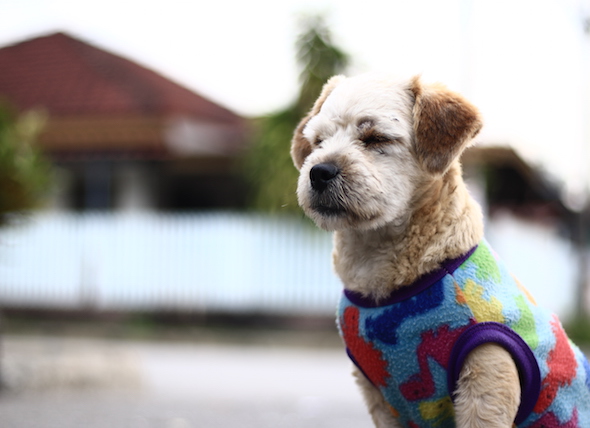Over the centuries, dogs have been trained for many tasks. Native Americans used dogs to help them move their encampments. Arctic cultures trained dogs to pull sleds and to provide transportation. The military has trained war dogs since the 1940s. Specially trained dogs have become a staple of most police forces.
There are dogs trained as helpers for the disabled and dogs trained specifically to provide friendship and comfort to the ill and infirm. Of course millions of dogs are trained every year simply to be good family companions and friends. Dogs are trained regularly for an amazing number of tasks, with new possibilities coming to our attention frequently. One such new application for trained dogs is assisting medical professionals in the diagnosis of cancer.
Researchers across the United States and Europe have discovered that the super-sensitive noses of dogs, which have more than forty times the number of smell receptors as the human nose and are believed to be several thousand times more powerful, might some day be able to serve as a great diagnostic device. Dogs are being trained to sniff out cancers and the results are amazing.
The strong sense of smell possessed by dogs has been used to human advantage for some time. Drug-sniffing dogs, for instance, have assisted in successful interdiction of countless tons of illicit narcotics. Bomb-sniffing dogs have been trained to sense the slightest presence of explosives. Now researchers believe that a dog can smell the difference between healthy human cells and those that are cancerous. The difference in smells between the two cell types is imperceptible for a human nose. Well-trained dogs, however, seem to be able to differentiate between the two.
Even the most complicated and expensive diagnostic technology, some maintain, cannot rival the nose of a dog when it comes to sensing the presence of cancer in its earliest stages. Some supporters of cancer-sniffing dogs argue that the animals are able to identify stage one cancers when most diagnostic equipment misses its presence.
Research is in its nascent phases and as of yet no conclusive evidence has been presented to satisfy the stringent requires of the medical community, but specially-trained dogs have shown an incredibly ability to sense the difference between healthy and cancerous cells. Research is ongoing and it will undoubtedly take many years before the use of trained cancer-sniffing dogs gains universal acceptance even under the best of circumstances. However, activity so far shows reason to believe that dogs might become part of every major hospitals diagnostic team.
In one experiment, a specially trained two year old poodle was given several urine samples to compare. Some of the samples were from patients suffering from bladder cancers. Others were from healthy individuals. In a shocking eighty seven percent of the trials, the dog was able to correctly identify which samples were cancerous-a percentage high enough to rule out the possibility of simple luck. English studies utilizing similar methodology showed that dogs were able to successfully identify cancerous samples approximately three times as often than one would be able to based upon luck alone.
Cancer-sniffing dogs are trained using a methodology very similar to that used with drug dogs and bomb-sniffing dogs. So far, the experiments have shown a great potential for the cancer-sniffers. There are those who do not believe the dogs will every be a reliable tool, but many in the medical community are excited at the prospect of utilizing trained dogs to help diagnose cancers. They maintain there is a detectable difference in odor between healthy cells and those impacted by cancer and that a properly trained dog can, indeed, tell the difference between the two.
Dogs are already considered man's best friend-and with good reason. In addition to being our friendly companions, they continue to provide us with assistance in many ways. From the rescue St. Bernard to the Sheltie sheepherders, dogs have proven themselves worthy partners in many endeavors. Their status as our best friends will certainly be even further cemented if current training and research allows our canine friends to become one of our best ways of detecting cancer in human patients before it has significantly progressed.

 The Hype of Hypoallergenic Pets
By Yahaira Cespedes
Allergy sufferers dread spring
The Hype of Hypoallergenic Pets
By Yahaira Cespedes
Allergy sufferers dread spring
 Small Intestinal Bacterial Overgrowth (SIBO) and Pancreatic Insufficiency
When a dog or cat is afflicted with exocrine pancr
Small Intestinal Bacterial Overgrowth (SIBO) and Pancreatic Insufficiency
When a dog or cat is afflicted with exocrine pancr
 Reducing Pet Fear in the Veterinary Setting: One Veterinarian’s Experience
This article is courtesy of The Hannah Society.
&n
Reducing Pet Fear in the Veterinary Setting: One Veterinarian’s Experience
This article is courtesy of The Hannah Society.
&n
 Your Dog and the Cold Germ
Can My Dog 'Catch' a Cold?
Winter isn&rsqu
Your Dog and the Cold Germ
Can My Dog 'Catch' a Cold?
Winter isn&rsqu
 How to Alleviate Arthritic Pain During the Winter
Dog Care for Cold Weather Aches
Many peopl
How to Alleviate Arthritic Pain During the Winter
Dog Care for Cold Weather Aches
Many peopl